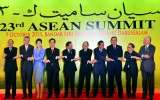Business community- a driving force behind global integration
The business community is generally credited as having made important contributions to the cause of national development.
A VOV reporter interviewed Pham Gia Tuc, Vice Chairman of the Vietnam Chamber of Commerce and Industry (VCCI), about the difficulties facing Vietnamese businesses as well as their concern in the context of global integration.
VOV: What is your opinion on the development of the Vietnamese business community?
Mr. Tuc: Along with the whole nation, the business community has grown dramatically, in terms of both quantity and quality, from 100,000 units in 1994 to more than 500,000 at present.
Especially since Vietnam joined the World Trade Organization, many large economic groups and businesses have gained ground in both domestic and foreign markets, such as Hoang Anh Gia Lai Group and Viettel Telecom Company.
In early 2011, Vietnam’s exports saw a significant increase of 22-23 percent while the trade deficit fell sharply. The GDP growth rate of 5.76 percent in the first nine months of 2011 was attributed to the great efforts of exporters.
VCCI has been assigned by the Party Politburo to draft a resolution on “upholding the role of the business community in the global economic integration”. Once the resolution is adopted, the business community will be eligible to bring into full play its role as a driving force in the process of national industrialization and modernization.
VOV: What do you think about the Ministry of Planning and Investment (MPI)’s announcement that 5,000 businesses closed down or stopped operating in the first nine months of this year?
Mr Tuc: It is normal practice, even in developed countries, that businesses close down or stop operating. No wonder the government’s decision to curb inflation by tightening monetary policy and reducing public investment in 2011 will, in part, affect the operations of both state-run and private businesses.
We should not worry about the MPI’s announcement since this is a small figure compared with 90,000 newly-opened businesses.
In fact, many businesses have had to restructure their organization. After ironing out snags they will be on the right track to resume their operations.

Outstanding women entrepreneurs honoured with Golden Rose Cup
VOV: A number of policies have been issued and brought to life later than they should be. Do you think this will be improved soon to help businesses through a tough time?
Mr Tuc: The Party and State have recently paid due attention to building laws, especially those concerning the business environment and businesses’ interests. In general, legal documents have created favourable conditions for businesses to go ahead with their operations and fulfill their plans.
However, it takes much time to build or revise laws because the National Assembly only meets twice a year. The promulgation of laws often lags behind business operations, not in tandem with the speed of integration into the global market.
VOV: What has VCCI done to encourage the operations of the business community?
Mr Tuc: First, when the resolution on “upholding the role of the business community in the global economic integration” is approved by the Party Politburo, VCCI will work closely with localities to promote the promulgation of the resolution and develop programmes to support the business community.
Second, VCCI has already outlined a programme to help the business community implement the Party Politburo’s resolution 02 and the government’s resolution 11 aimed at curbing inflation and ensuring economic growth. It is necessary to encourage private businesses to join efforts to handle the difficult situation.
Third, VCCI will continue with its coordination programme to develop the business community. VCCI will work closely with ministries and agencies to help businesses with policy and capital related issues. We also encourage businesses to use domestic products in response to the “Vietnamese using Vietnamese products” campaign.
(VOV)
Vietnam, Canada enhance cooperation, connections
Vietnam, Italy seek to further expand economic, investment cooperation
Vitenam, Italy seek to further step up locality-to-locality cooperation
Vietnam, Japan work to materialise comprehensive strategic partnership
Argentina hopes to foster economic, trade, investment collaboration with Vietnam
 Seminar held to promote Vietnam - Algeria economic relations
Seminar held to promote Vietnam - Algeria economic relations
 Vietnam, France enhance transport cooperation
Vietnam, France enhance transport cooperation
 Vietnam, Singapore deepen economic, energy cooperation
Vietnam, Singapore deepen economic, energy cooperation
 Vietnam keen on expanding trade, investment cooperation with Ireland: Minister
Vietnam keen on expanding trade, investment cooperation with Ireland: Minister
 International integration drives Vietnam’s economic growth
International integration drives Vietnam’s economic growth


